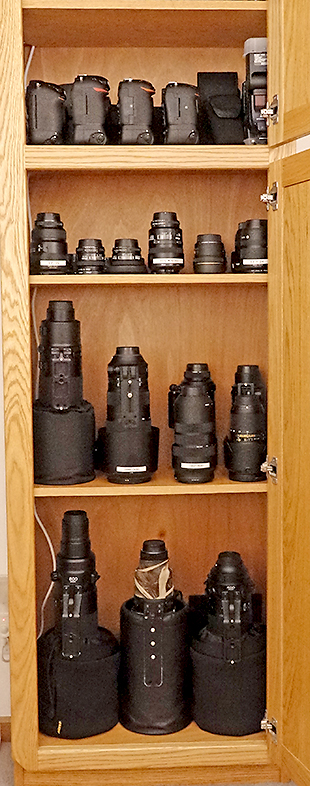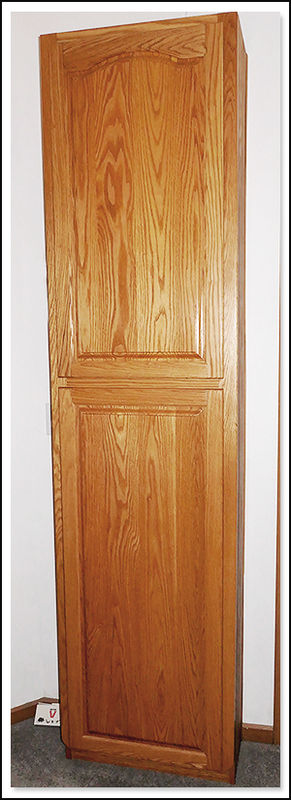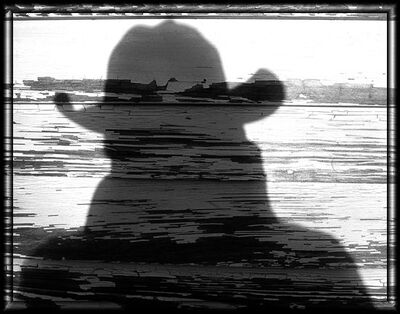Where do you store your stuff when not in use?
Nov 1, 2018 13:57:08 #
aschweik wrote:
I am accumulating camera equipment and right now i... (show quote)
Good question. Requirements are: dry air, stable temperature, freedom from dust, out of harm's way.
Most of the worst damage I see to cameras and lenses is due to moisture. It can cause corrosion or
what is even worse, fungus. Electrical contacts are partciularly vulnerable to corrosion and optics are
particularly vulnerable to fungus.
Obviously, humidity is a bigger problem if you leave in New Orleans or Jacksonville than if you live in
Flagstaff, AZ or Barstow, CA. But San Francisco can be humid when the fog rolls in. Any interiors of
houses can get humid anywhere, anytime, due to cooking, bathing, mopping etc.
Transient humidty (for a short period) usually does little harm. But why take the risk?
Unfortunately, people are usually unaware of humidity except on hot summer days. So it's not a bad
idea to buy an inexpensive hygrometer (often combined with aneroid thermometer). Don't laugh:
a lot of acoustic guitarists and violinists keep one in their instrument case (fussy things, musical
instruments). Better to know the relative humidity than to guess.
Modern cameras have no wooden parts and contain no moisture when they leave the factory (unlike
a guitar or piece of furnature.). So the drier the air, the better.
Taking air and heating it reduces relative humidity. So in cold climates, the air inside heated structures
is usually very dry. Cooling increases relative humidity, but cool air enough in an air conditioner
and the moisture condenses out. So in the summertime, air conditions also reduce humidity when
the air warms back up. So cameras and lenses should not be stored near an air condtiioner vent.
Start with an interior closet or cabinet in a heated part of the house. It shouldn't not touch an outside wall,
since both cold and moisture can come through walls.
But what do you do if it is 72F outside and raining? Relative humidity outside is probably 90% and
inside it's probably close to 99%. Nothing will dry out. What can you do?
Tupperware + dessicant pack = peace of mind
Actually, square food storage boxes with lids that seal work the best for cameras, and cylindrical beverage
storage containers with lids work the best for lenses. I like clear ones, so I can see what's inside. A fresh
dessicant pack is essential--without it, air-tight containers will trap moisture.
Get the type of dessicant that turns blue when it's full of water and can be dried out in the oven (follow the
dessicant manufacturer's recommendations). It's made of little round granules of silica gel inside a
plastic
Something to know about plastic bags: moisture vapor (and gasses) can penetrate flexible plastic! That's why
your loaf of bread comes wrapped in cellophane inside the plastic bag: to keep it fresh. Plastic bags
slow down water vapor but don't stop it. Nevertheless, freezer storage bags are useful because they keep
out dust and allow you to pick up a piece of equipment without getting fingerprints all over it.
When trying to protect something, "belt plus suspenders" is a good idea: camera & dessicant pack inside of
a plastic bag inside of a plastic box inside of a dry closet. (BTW, this is also the rule for security systems:
never rely on just one thing.)
If you storing really valuable equipment, then an oxygen-getter pack can be added to the container in
addition to the dessicant pack. (The usual one consists of sodium sulfie, a old friend from darkroom days.)
This will prevent rust and deterioration to plastics and rubber by removing all the oxygen. It will also prevent
foam light seals from tuning to goo -- a very, very common problem on decades old film cameras.
Tip: Never put away a camera or lens that is (or might be) damp. If the lens or camera has been
used in moist conditions, Let it dry out thoroughly in a warm room before placing in storage.
Tip for winter: if a lens or camera has been used outside and feels cold to the touch, to prevent
condensation, place it in a plastic bag before bringing it inside. Leave it in the bag in
a warm room (or vehicle) until it warms up, then remove the bag and let it dry out as above.
Hope this information is helpful. If it seems excessive, it won't to anyone who has looked down an
expensive top-of-the-line lens that is full of fungus.
Nov 1, 2018 14:51:26 #
When I added to my house, I built a room for a studio and in there I converted a kids toy rack with plastic boxes into storage for my equipment. The cameras sit on a shelf nearby but still in the studio.
Nov 1, 2018 19:30:15 #
Kmgw9v wrote:
Everything is in a spare bedroom that my wife never enters.

Nov 1, 2018 19:37:00 #
Bipod wrote:
OMG! Pertinent. Very good, Bipod! Good question. Requirements are: dry air, stabl... (show quote)

Nov 1, 2018 19:37:08 #
My answer - in my home office scattered all around my desk which, for now, also happens to be my living room - aaaagh! I'm waiting for one of my twin boys to go off to the Coastguard so I can take back a room for a real office. My wife waits on baited breath for the day I get the heck out of her living room.
aschweik wrote:
I am accumulating camera equipment and right now i... (show quote)
Nov 1, 2018 20:02:33 #
Thanks for all the great responses. I gained some good ideas and some knowledge, too. And maybe I won't have to kick out a kid, after all!
Thanks, again, everyone!
Thanks, again, everyone!
Nov 1, 2018 20:55:04 #
I have an armoire devoted to photo. It is attractive enough to go anywhere--Art Deco burled walnut. My antique bed is rather high up, so camera cases (even large format) can go under. Plus half a hall closet, and some things
such as a disused enlarger and cases of flashbulbs in the shed outside (not cameras and lenses). I would not store sensitive items in basements, attics, or sheds (fungus, etc.) When I lived in the city in a small apartment, I kept a storage unit where indoor conditions were maintained, but this was $100 a month.
such as a disused enlarger and cases of flashbulbs in the shed outside (not cameras and lenses). I would not store sensitive items in basements, attics, or sheds (fungus, etc.) When I lived in the city in a small apartment, I kept a storage unit where indoor conditions were maintained, but this was $100 a month.
Nov 1, 2018 21:28:52 #
The cabinet is 10" deep x 24" wide x 96" tall. There are three more shelves above what's shown filled with assorted photographic stuff.


Nov 2, 2018 03:05:36 #
For the past month both my cameras and all lenses now live in a humidity controlled cabinet, https://www.bhphotovideo.com/c/product/1282132-REG/ruggard_edc_80l_electronic_dry_cabinet_80l.html all other odds and ends in sealed plastic boxes.
Living by the sea with very high humidity (97% today) I'm now a much happier man.
Living by the sea with very high humidity (97% today) I'm now a much happier man.
Nov 2, 2018 05:16:22 #
aschweik wrote:
I am accumulating camera equipment and right now i... (show quote)
Don’t know about Ohio but CA is pretty dry so moisture is rarely a problem.
I keep all of my stuff in a non-insulated gun safe and also a smaller 2’x3’x18” job box that’s chained to a wall.
I keep rolls of print paper and other papers in an open shelf. Everything is in my office!
SS
Nov 2, 2018 05:30:01 #
I've had a kid move back home so my man cave has disappeared, I have now moved to a downstairs closet, used to be used for storing coal. It is now painted out and fitted with shelves and the top shelf holds all my bagged cameras and flash gear, my stands and lighting are stored in the loft with easy access.
Nov 2, 2018 06:01:15 #
aschweik wrote:
I am accumulating camera equipment and right now i... (show quote)
I use the large plastic boxes you can buy in many stores - they are pretty well sealed and I also put in Silica Gel bags to prevent any moisture problems and I place bubble wrap on base and the boxes can be easily stored and avoid untidy heaps of photography equipment.
Nov 2, 2018 06:10:22 #
I have a cabinet with neat trays for the filters and batteries. All well and good, if only I would put the stuff back. Often for my quick grab cameras they are in bags with all that I need to zoom out the door.
Trump promises that we are covered by the second amendment and can continue our shooting sport.
Trump promises that we are covered by the second amendment and can continue our shooting sport.
Nov 2, 2018 06:19:08 #
I bought a safe and put it in a closet. I then built some basic shelves for tri- and mono-pods. My travel cases are in the garage until use. I store everyday cameras in a large Pelican case stored under my pool table. I also have several extra pelican cases for keeping my photo prints in case of a hurricane also stored under the pool table.
Now, while trying to store various camera items, I realized there were many things I did not use anymore. So I took loads of used camera equipment and traded it at a local store for some things I really wanted. Thus, my 600 F4.0E and a D850. Ahhh, life is good.
Now, while trying to store various camera items, I realized there were many things I did not use anymore. So I took loads of used camera equipment and traded it at a local store for some things I really wanted. Thus, my 600 F4.0E and a D850. Ahhh, life is good.
Nov 2, 2018 06:38:22 #
aschweik wrote:
I am accumulating camera equipment and right now i... (show quote)
I have large gun safe, keep it all there.
If you want to reply, then register here. Registration is free and your account is created instantly, so you can post right away.










